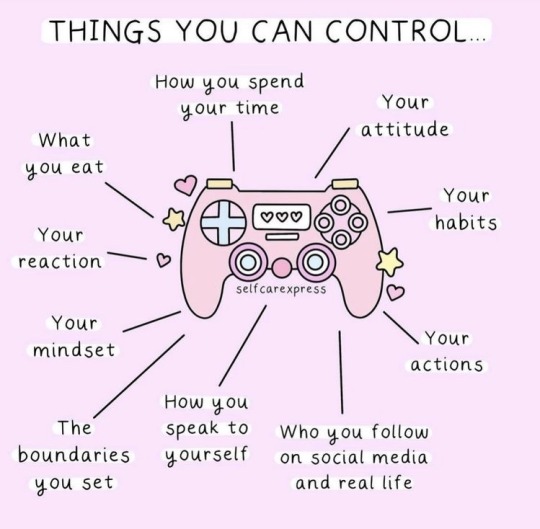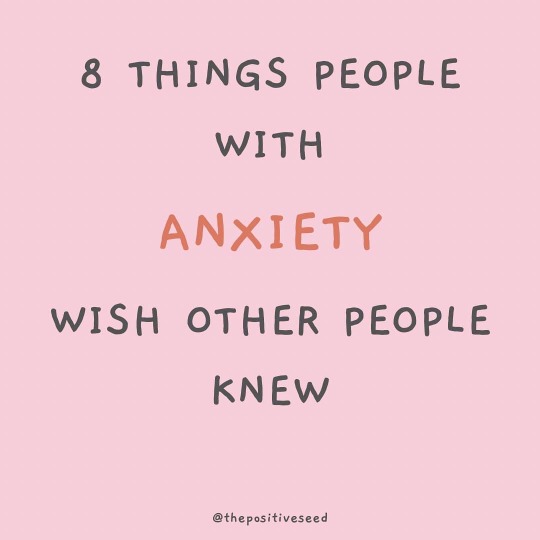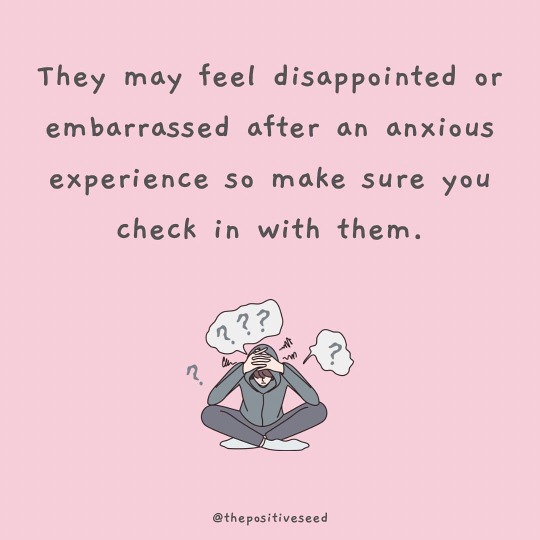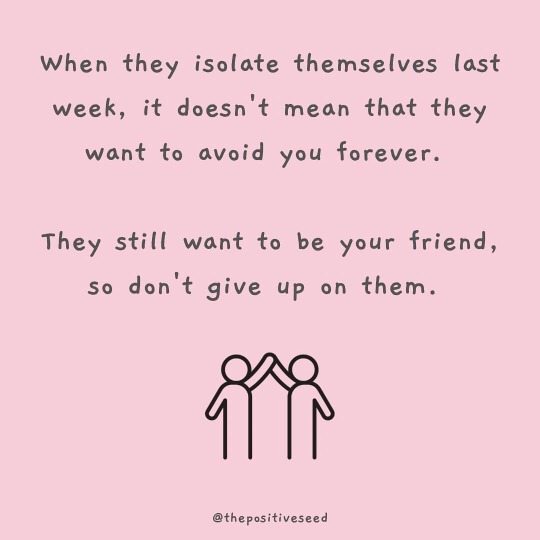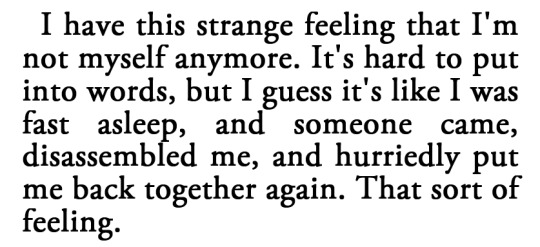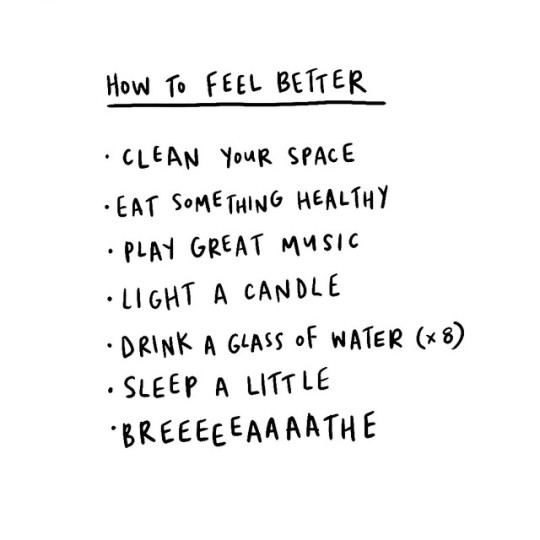Text

Self Reflection Result in 2023
These past few years, I always on alert of everyone, especially new people, so I build countless walls to prevent getting hurt. I thought I am fine with that. But these past few months I try to connect with people. Surprisingly, I feel happier and see life differently (in a positive way).
So, I will continue to build more bridges this year. ❤️
0 notes
Text
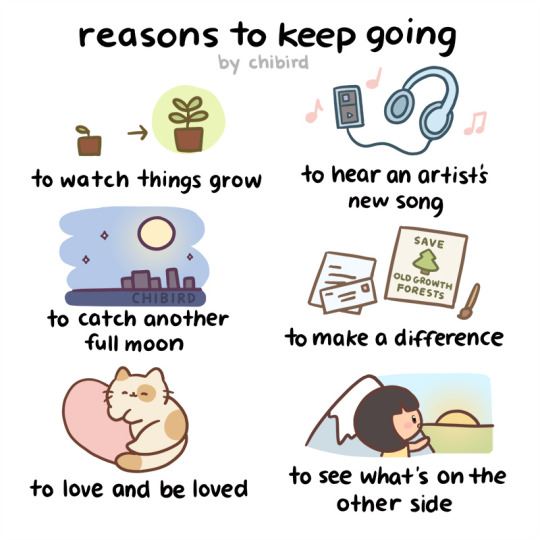
There are so many reasons to keep going! Here are just a few.
8K notes
·
View notes
Text
"Sometimes, I hope people can always say what they truly feel. And be genuine about it. No restrictions. No holding back. No keeping all the most important parts.
But then I remembered that I myself couldn't even do that. So why would I expect other people to be like that?
I realized that sometimes we have to choose what we only have to say from the words that we truly want to say. Every word doesn't have to be said out loud; rather, let our actions show what we truly mean. Because not everyone has the time to listen to what we're about to say, and that's totally okay. We human beings don't have all the time in the world to understand everything that's happening around us. We're all busy trying to save ourselves and live life the way we want to.
So it's fine if you can't compose yourself to say everything you want to. But remember that there are so many ways to reach those people who are important to you. And I hope you'll be surrounded by the right people who will lend an ear to hear the stories that you've been holding onto."
I wish I was braver // ma.c.a
736 notes
·
View notes
Text
take yourself on a date. get to know who you are. learn your interests. prioritize yourself. we spend too much of our time out of touch with who we really are. we try so hard to fit in, to impress others, we lose sight of ourselves. it’s time to put ourselves first. it’s not selfish, it is self care. you cannot grow if you never change. you deserve the life that you dream of.
3K notes
·
View notes
Text
“In the end, we only regret the chances we didn’t take, the relationships we were afraid to have, and the decisions we waited too long to make.”
— Lewis Carroll (via quotesoh)
7K notes
·
View notes
Text
M
I just found this in my draft from years ago, still worth to share :)
I remember the first time we talk after years. Think about it, it’s kind of weird, isn’t it? After years, this time we really talk, not just greet each other politely like we used to.
I remember you ask me where do I work and I told you I work for a startup. I remember you ask me, “Are you one of the founder?” That’s the question that inspires me.
Maybe for you, it was just an everyday question that you would ask to a friend that you didn’t see for a longtime. But for me, it’s not just it.
When you ask me that question, you remind me something that I long forgot to believe. Believe in myself. Believing that I can do something big, something great. I start to have faith in myself again.
I’m glad that we start to talk to each other at the right time, at least the right time for me.
Remember the book that you told me about life purpose? To be honest, the first time I start to read it, it was just because I’m curious of what kind of book are you reading. But it turns out it was really a good book.
For months or maybe years (I’m not sure), I’m having the quarter life crisis. Nothing is wrong, but nothing is right either. I feel lost. I’m just alive, but with no purpose.
I’m losing myself. Myself who used to believe that I will be successful. Myself who used to believe that I can do something big, something great. Myself who used to have passion in everything that I did.
I told you I was lost and asking you a lot of questions. Somehow, it helps when someone share their story and you can find a light in it. It feels like I’m walking on a street with no light for long time, trying to find my direction in the dark, and then suddenly I saw a light.
I’m glad that you did not judge me for what I’m telling you (or maybe you just didn’t show it directly hahaha). I like to know your story. I like the way you passionately told me about it.
You are a blessing. You are a blessing in my life, eventhough not in the way I want it. But still, you really are a blessing to me.
“The greatest blessing in the whole world is being a blessing.” - Jack Hyles
0 notes
Text
Grezia Epiphania - Walau ‘Ku Tak Dapat Melihat
Walau ‘ku tak dapat melihat semua rencanaMu Tuhan
Namun hatiku tetap memandang padaMu
Kau tuntun langkahku
(Even I cannot see all of your plan God
But my heart still looking at You
You guide my steps)
0 notes
Text
Sari Simorangkir - Kaulah Harapan
Bukan dengan kekuatanku, 'ku dapat jalani hidupku
Tanpa Tuhan yang di sampingku, 'ku tak mampu sendiri
(Not by my strength, that I could live my life
Without God beside me, I cannot do it alone
0 notes
Text
The Parentified Child: How It Contributes to a Depressed, Angry, and Resentful Adult

Were You a Parentified Child?
When you were a child, did your mom or dad turn to you for comfort and advice when they were struggling with problems at work, in their marriage, or with finances?
Did you share a special bond with that parent because you were their confidant and caretaker?
Did you forgo hanging out with friends, joining teams and clubs, and just being a kid because you were busy attending to your parent?
Do you now feel resentful because you missed out on a happy, carefree childhood?
If responding “yes” to these questions, you were a parentified child. As a result, you may be struggling in adulthood with sadness, anger, and depression. Don't give up hope, though, because recognizing the root of your problem gives you an opportunity to heal. You can find ways to make up for the joy you missed as a kid.
What Does It Mean to Be Parentified Child?
Parentification happens when a child switches roles with her mom, dad, or both, becoming the caretaker in the relationship. She may become this in an emotional way—listening to the parent's problems, giving them comfort, and offering advice. She may also do it in a physical way—cleaning the house, taking care of siblings, making meals, and even paying bills. Youngsters often become parentified when mom or dad is an alcoholic, a drug user, disabled, divorced, or mentally ill.
How I Became a Parentified Child at the Age of 12
My parents' marriage started to fall apart when I was 12. My mother suspected my father was having an affair with a woman at work. She and I would take hour-long walks every afternoon when she'd confide in me her worries, criticize my father, and even talk divorce. I'd listen intently, flattered she was trusting me with these grownup matters and offering what advice I could. Even though I was just a kid with little experience in relationships, she'd compliment my wisdom, saying I would make an excellent psychologist some day. Listening to her problems and giving counsel was how I got her attention and validation.
As a kid, I didn't think too much about this dynamic between my mother and me that lasted until I went off to college. I was just happy to spend time with her and be her confidant. It wasn't until I became a mother myself that I realized how horribly wrong it was to burden me with these adult issues, turning me against my father and making me cynical about marriage. I began to understand how she used me and robbed me of my childhood. I also learned that what she did wasn't that uncommon and actually has a name: parentification.
Parentification Can Cause Long-Term Problems Including Depression, Isolation, and Anger
Dads and moms who parentify a child often don't realize they're doing something incredibly harmful. My mother was going through a midlife crisis at the time she turned to me for comfort and support. She was unhappy in her job and feeling lonely because my dad was working long hours and traveling for business. When people at my dad's office began gossiping about an affair between him and a much younger subordinate, she was understandably embarrassed and upset. It tapped into her deepest insecurities as a woman and wife and caused her to think and act irrationally at times.
Instead of seeing a therapist or talking to a friend, she turned to me in her time of need. This proved to be a critical mistake, forever damaging the relationship between my father and me and leading to severe problems later in my life. After focusing on my mother's inner world for so many years, I felt unworthy of any attention being directed at me. I didn't know how to advocate for my own needs and desires. The consequences of being a parentified child finally caught up with me as an adult when I struggled with depression, isolation, and anger.
Bethany Webster deals specifically with mother-daughter relationships in "When Shame Feels Mothering: the Tragedy of Parentified Daughters." She writes, "A daughter is being exploited when her mother gives her adult roles, such as surrogate spouse, best friend or therapist...When a daughter is asked to be an emotional prop for her mother, she is unable to rely on her mother enough to get her own developmental needs met." As a result, the daughter can grow up to be an emotionally stunted adult with little self-confidence.

Depression
It's not unusual for a parentified child to become a depressed grownup. I struggled with extreme sadness most of my adult life, taking anti-depressants to numb the pain and going to therapy to get at the root of my heartache. My life transformed when an astute doctor gave me an aha moment, explaining that I had been parentified as a youngster and was suffering because of it. Until that moment, I had never heard of parentification. Having a name for what I experienced as a kid made me feel much better.
During the six years I acted as my mother's emotional caretaker, a tremendous burden was put on my shoulders even though I didn't realize it at the time. I dealt with adult issues that I didn't understand—marital infidelity, a midlife crisis, jealousy, insecurity, and rage. I worried my parents would divorce. I worried we'd have to sell our home and move away from the neighborhood I loved. I worried about our financial outlook and how we'd cope without our dad. I worried how my younger siblings would be affected. I worried about my mother's emotional stability and how I could make her feel better.
My decades-long battle with depression finally ended when I mourned the loss of the happy, carefree childhood I never knew. Kati Morton, a licensed marriage and family therapist, says the grieving process is key to healing. She says it includes acknowledging that what happened to us was not okay coupled with the motivation to move forward.
I started to nurture the little girl inside of me who didn't get the love and attention she craved. I began to enjoy some of the fun and frivolous activities I wanted to do as a kid but was never given the chance: going to a circus, roller-skating in the park, visiting Disneyland, and even having a sleepover with some of my friends.
Isolation
A parentified child can also grow up to be a lonely and isolated adult. During my teen years, I desperately needed a parent to give me advice and listen to my concerns about friends, dating, school, teachers, homework, my hair, and my makeup. My mother, though, couldn't see beyond her own problems to help me. My father, knowing that I was now my mother's confidant, largely avoided me even though we lived under the same roof. I spent too many hours alone in my room, feeling sad and scared. Instead of having the normal adventures of a teen—going to football games, hanging out with friends, and joining clubs and teams—I stayed close at home, feeling responsible for my mother's well-being.
Some therapists even consider parentification a form of child neglect. Because the youngster misses out on basic childhood experiences, her development is seriously impeded. This was certainly true in my case. I didn't get to enjoy the fun and frivolous activities that shape a teen's life. My role as my mother's confidant and emotional caretaker set me apart from my peers. Because we didn't have shared experiences in common, we didn't have much to say to one another. I had few friends and no social life.

Anger
According to Maggie Olivares, a social worker who's dealt with many parentified kids, anger is another byproduct that comes from missing out on a carefree childhood. When they become adults, they look back on all those years when they had too much responsibility and not enough fun and are resentful and bitter. They struggle to maintain a relationship with the mom or dad who parentified them and may even choose to end it.
To this day, I have tremendous anger toward my mother for using me that way. It turned out that my father was never having an affair and it was all in my mom's head, triggered by her deep insecurity. When my dad and her grew closer again after years of being distant, she unceremoniously dumped me. I was no longer needed as her confidant and ally. My relationship with my dad had been annihilated years before that, and I was left with nothing.
Fortunately, I've forgiven my mother and moved on with my life, but I still find it difficult to trust people. In the back of my mind, I'm worried about being used again. I often see friendships as depleting rather than energizing. While my mother has apologized for talking badly to me about my dad, she certainly hasn't owned up to how she turned me into a parentified child and caused disastrous effects in my life.
Final Thoughts
If you were parentified like I was, missing out on a carefree childhood, it's easy to spend your adult life feeling sad and resentful. In Bad Childhood, Good Life, the author encourages us to understand how our past affects our present but discourages us from making it our identity. Just because we were parentified as kids doesn't mean we have to wear the badge of perpetual victim. We can put our early years in perspective and move forward, knowing we're now in charge of our destinies. We can feel empowered and hopeful, building a happy and meaningful adult life even though we missed out on a lot during childhood. We deserve it.
3 notes
·
View notes
Text
Fatherless Daughters: How Growing up Without a Dad Affects Women
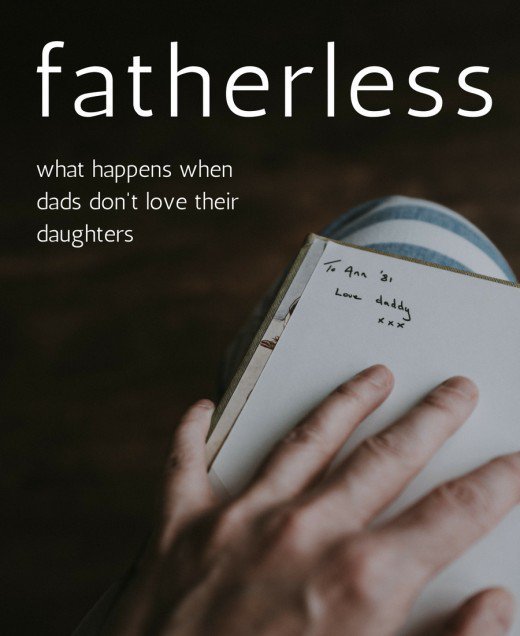
Growing Up Without a Dad Shapes Who You Are
It took six decades, but I can finally utter a huge truth that caused me tremendous shame and sadness: My father didn't love me. I never spoke that deep, dark secret, but it was always festering inside of me. It manifested itself in many ways throughout my life as I struggled with a food obsession, low self-esteem, social anxiety, and depression.
Whether a dad was present but rejecting like mine or walked away from his fatherly duties entirely, his absence leaves an indelible mark on a daughter's psyche as she grows into adulthood. What does the research say about woman who grew up with fathers who didn't love them—daughters who were never daddy's little girl?
Below, you'll find six ways a daughter may be affected by an uninvolved dad.
Fathers provide their daughters with a masculine example. They teach their children about respect and boundaries and help put daughters at ease with other men throughout their lives. [...] So if she didn't grow up with a proper example, she will have less insight and she'll be more likely to go for a man that will replicate the abandonment of her father.
— Caitlin Marvaso, AMFT, a grief counselor and therapist in Oakland, CA
1. Fatherless Daughters Have Self-Esteem Issues
According to Deborah Moskovitch, an author and divorce consultant, kids often blame themselves when dad leaves the home and becomes less involved in their lives. When they aren't given an explanation about why dad left, they make up their own scenario and jump to the conclusion that it's their fault and that they're unlovable.
This is especially true for daughters. Countless studies have shown that fatherlessness has an extremely negative impact on daughters' self esteem. Her confidence in her own abilities and value as a human being can be greatly diminished if her father isn't there. Academically, personally, professionally, physically, socially, and romantically, a woman's self esteem is diminished in every setting if she did not form a healthy relationship with her father.
As a child, I watched television shows like The Brady Bunch and Happy Days in which the fathers showered their daughters with tremendous amounts of attention and affection. Because I never got that from my dad, I convinced myself it was because I wasn't cute enough. I thought if I had blond hair and talked with a lisp like Cindy Brady I would then have my dad's devotion. I hated the way I looked because I thought it caused my father's disinterest in me. As I got older, my self-esteem plummeted and I was sure no man would ever find me attractive.
2. Daughters With Absent Fathers Struggle to Build and Maintain Relationships
According to Pamela Thomas, author of Fatherless Daughters (a book that examines how women cope with the loss of a father via death or divorce), women who grew up with absent dads find it difficult to form lasting relationships. Because they were scarred by their dad's rejection of them, they don't want to risk getting hurt again. Consciously or unconsciously, they avoid getting close to people. They may form superficial relationships in which they reveal little of themselves and put very little effort into getting to know others. They may become promiscuous as a way of getting male attention without becoming too emotionally involved.
Ever since childhood, I've built walls around myself. I didn't open up to people. I didn't ask questions about their families, jobs, or hobbies. I kept my life private, and I remained socially isolated. These were all self-protective measures so I wouldn't experience rejection like I did with my dad. Knowing this intellectually did nothing to help me change my behavior because my fear of rejection was more powerful than my desire to make connections.
3. Women With Absent Fathers Are More Likely to Have Eating Disorders
In their book The Parent's Guide to Eating Disorders, the authors Marcia Herrin and Nancy Matsumoto write eloquently about the fact that girls with physically or emotionally absent fathers are at greater risk of developing eating disorders. Anorexia nervosa, bulimia, binge-eating, body dysmorphia, unhealthy preoccupations with food or body weight, and other eating disorders are all more likely if a girl does not have a father figure as she's growing up. Daughters without dads are also twice as likely to be obese. Because her longing to have a close relationship with her dad is denied, she may develop what Margo Maine (author of Father Hunger: Fathers, Daughters, & Food) calls “father hunger,” a deep emptiness and a profound insecurity. Daughters are left wondering: What's so wrong with me that my own father doesn't love me? If I looked different—if I was thin—would I earn daddy's love?
I've struggled with "father hunger" throughout my life—stuffing my face to fill the void, dieting to get model-thin, and always obsessing about food. My days have been filled with thoughts of eating—either doing it or struggling mightily not to. When I accepted that my dad didn't love me and that he was an unhappy man with deep-rooted problems, I finally started eating normally and began maintaining a healthy weight. I began treating myself in a loving way by exercising, gardening, reading, walking in the woods, and spending time with family. For the first time in my life, I only thought about food when I was truly hungry. This freed me to enjoy my life in so many wonderful ways.
4. Daughters of Absent Fathers Are More Prone to Depression
Not surprisingly, girls who grew up with dads who were emotionally or physically absent are more likely to struggle with depression as adults. Because they fear abandonment and rejection, these women often isolate themselves emotionally. They avoid healthy romantic relationships because they don't feel deserving and fear getting hurt, but they might jump into unhealthy relationships that ultimately lead to heartbreak. In either scenario, the women are in emotional peril and frequently become depressed. If they don't deal with the cause of their sadness—an absent dad—they may never be able to develop healthy relationships with men.
To top it all off, data suggests that children without fathers are more than twice as likely to commit suicide.
According to Denna Babul and Karin Louise, authors of The Fatherless Daughter Project, it's helpful to simply realize that we're not alone. In fact, one in three women see themselves as fatherless and struggle with feelings of abandonment. Knowing this fact helps us see that there's a whole sisterhood out there who share a common pain and a need to connect. When we open up and share our journey, we help both ourselves and each other. Whether we feel the loss of a dad through death, divorce, drug addiction, estrangement, or emotional neglect, we must grieve in order to move forward. Read Five Steps to Heal Her Pain: How a Fatherless Daughter Can Move On From Her Dad's Rejection for ideas on how to avoid falling into depression. A gifted therapist can be key to helping us do just that and becoming happier people.
5. Dadless Daughters Are More Likely to Become Sexually Active Earlier
Studies have shown the many benefits that come from a strong father-daughter bond. Most notably, girls who are close to their dads are less likely to get pregnant as teens. They delay engaging in sexual relationships, wait longer to get married and have children, and when they do find a husband, their marriages are more emotionally satisfying, stable, and long-lasting.
Countless studies also show that women who have unstable or absent paternal relationships are more likely to start having sex earlier and engage risky sexual behaviors. Daughters are four times more likely to get pregnant as a teen if dad isn't in the picture. Studies show that more than 70% of unplanned teenage pregnancies occur in homes where there is no father.
My older sister (who, like me, did not have a relationship with our father) met her future husband when she was just 18 and married him when she turned 22, straight out of college. He was the only guy she ever dated. Without a doubt, she was looking for the love and validation she never got from our dad. She was looking for an alternative to a man who never said "I love you" or "you're pretty" and never gave the unconditional acceptance one craves from a parent. Although she is still married, her union has been a difficult one, and she discourages her own daughters from marrying young.
6. Abandoned Daughters Are Susceptible to Addiction
As with depression, eating disorders, and low self esteem, the absence of a father can trap a daughter in a negative repetitive pattern she can't easily break out of and turn to drugs to self-medicate and help numb the pain. She is more likely to find herself trapped in a cycle of substance abuse, for example. According to the U.S. Department of Health and Human Services, fatherless children are at a dramatically greater risk of drug and alcohol abuse. Not only are kids in father-absent households about four times more likely to be poor (which can trigger many negative cycles), fatherless adolescents were found to be 69% more likely to use drugs and 76% more likely to commit crimes.
Can a Daughter Survive Without a Father?
Try as I might, I was never been able to get any traction, always making a mess of this or that and never able to form long-lasting friendships. I rejected happiness because I never felt worthy of it. I did so much to sabotage my life and make myself miserable.
Then last year my older sister revealed to me that she, too, had felt unloved by him. I immediately felt enormous relief and then great euphoria. I realized it had never been about me—that I was bad, ugly, stupid and undeserving. It had always been about him—his unhappy childhood, his cold mother, his negative nature, and his dissatisfaction with being a husband and father. It had never been about me...never.
I could finally shout: “You were a piece of crap and now I'm done with you! I'm not your prisoner any more!"
According to Caitlin Marvaso, AMFT, a grief counselor and therapist, to recover from a father's abandonment, a woman "must learn how to father herself, hold herself, and receive the type of love a father provides. It is a lifelong process, but with the proper support, tools, and patience, it is totally possible. That being said, the grief and pain never goes away, it just changes."
A daughter whose father abandoned her can grow, thrive, learn, excel, succeed, love and be loved, and live a wonderful life when she realizes that the problem isn't her, it's him. This is the first step toward healing.
#McKenna Meyers#fatherless#fatherless daughter#fatherless daughters#fatherless kid#fatherless kids#father hunger#father
2 notes
·
View notes
Text
Sometimes getting what you want is not always the best thing.
1 note
·
View note
